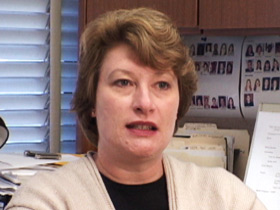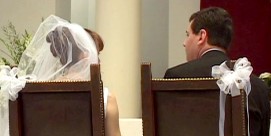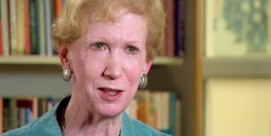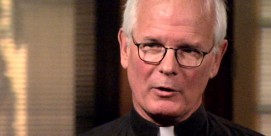In This Episode << SLIDE LEFT TO SEE ADDITIONAL SEGMENTS
Penny Edgell Extended Interview
Read more of Kim Lawton’s interview about faith and family in America with Penny Edgell, professor of sociology at the University of Minnesota and author of RELIGION AND FAMILY IN A CHANGING SOCIETY (Princeton University Press, 2005):
How important are religious congregations in shaping people’s views about family?
I think they’re actually quite important because that’s the place where official religious doctrine is really interpreted. It’s interpreted from the pulpit in sermons and in discussion groups and forums. But it’s also lived in the way things are organized and planned. What kinds of activities you have, what kinds of people you include in the life of your community — that’s what makes official views about the family real to people.

How significant a distinction is this — lived religion versus official doctrines?
Some people — evangelicals are one group, and Catholics are another, and committed people in various faiths — do seek out other sources. They seek out books and speakers, and they are involved in national organizations, and they’re really very knowledgeable about the official doctrine, the official views, what the elites think. But most people are not like that. For most people in the pews, the congregation is one of the main venues through which they get a real sense of “what it is that my religious tradition teaches.” People get religious ideas through a variety of sources, and people pursue a variety of paths to express their religion. But when it comes to asking questions about what it is that I believe or we believe as a religious community, congregations are probably the place for many, many people.
To what extent have people’s ideas and beliefs about family changed in recent years?
In my book I really focused on the transition from the 1950s to the present, and what I found was that for many, many congregations, for many people in local religious communities, the messages they’re getting are very similar to the messages they got in the 1950s. There’s still an emphasis on nurturing, on parenting. In many places there’s still a kind of nostalgia for what I call an “Ozzie and Harriet” family, a male breadwinner family. What I found surprising was that nostalgia was in both evangelical churches, which we might have expected because we know what their official views about the family are, but also in mainline Protestant and Catholic churches. For many of the people who are out there, who are sitting in the pews on a Sunday morning or attending some activity, they’re getting a pretty unchanged message. But I also found that there were a lot of congregations where there was really quite a bit of innovation. There was a lot of talk about how we make dual earners fit. There was a lot of talk about the single parents fit. There was a lot of talk about ministry to single parents and the divorced. And in a few congregations that I call innovators, there was a radically different message about family that said it doesn’t really matter who does what. It’s not about traditional gender roles. Family is a loving, committed, caring unit that goes through life together, that faces life together. And those churches also, to some extent, displaced the family from the center of what they were doing in congregational life. They had lots of ministry for family, but they had lots of ministry that wasn’t organized according to your family life or what we call your life stage — groups for mothers, singles. They didn’t organize themselves that way. They tried to organize their ministry in a way that, regardless of your family situation, this is a community where you are welcome. So I think there is a big range out there. Fewer churches are doing these innovative things, but those tend to be big, and there are a lot of people in them, which tells me that there’s a hunger out there for things that are really relevant to the way family life is actually lived today.
Is that because we’re seeing a growing disconnect between traditional teachings and people’s realities?
I think that’s part of it. One of the other things I found is that in these communities people had different expectations and went to local churches for different reasons, and for some people it really was all about finding a place where they could live their family life through this religious community. But for other people it was much more a question of, does this place reflect what I believe? Do I find it religiously authentic? And for those people who are, say, more critical of their local religious institutions, they were really more demanding that the local place reflect their sense of where they were, where their families were, but also where their own religious beliefs had moved to.
Are changing family situations in America putting new pressures on religious communities?
That’s a good question. When you start to talk about what’s changed in family life, the changes have been taking place for a long time. We tend to have nostalgia for the ’50s and to think that was the norm, but it wasn’t. The ’50s were really an exception, and since the ’50s we’ve seen almost continuous change — changes in the way that youth relate to parents, and that, of course, was very dramatic in the sixties. Changes in the divorce rate. That’s been going on for a long time, since the late sixties. Changes in the number of women who are in the paid labor force and when they enter the labor force. Many, many more women work now when their children are pretty young, and that’s a big change. But that happened 30 years ago. It’s not so much that there’s been rapid change now and churches are responding to it. There have been changes building up for a long time, and religious institutions have lagged in how they’ve dealt with that, which is common for institutions. They figure out a way to do things, and then they stick with it. That kind of model of what ministry for a family should be was developed in the ’50s and stuck around for a long time, and it’s been very slow to change.
Are conservative congregations — traditional, evangelical, Catholics — also being forced to reach out to people who don’t necessarily meet their religious ideals?
In my book I make a distinction between radical innovation, which is reconceiving what a family is, and incremental innovation, which is keeping your idea of what a family is but doing whatever you can in terms of practical changes in ministry to reach out to more people, and lots of evangelicals and conservative Catholic communities are doing that — reforming the way they do religious education and Sunday school and confirmation. They don’t really care what time people are in church during the week. If a Wednesday night works better than a Sunday morning, great. They don’t really care about the practicalities of that. They’re willing to do whatever will work. But they don’t compromise or change the core of their message, and that has led to a very successful profile of ministry for many of these churches.
Are they being forced to change some of their beliefs because of the families in their congregations?
I think they have changed some things. They’ve been very smart about it, in a way. They’ve changed, for example, the way they talk about men and women. So while they still emphasize that the man is the head of the family, they also emphasize the man’s obligation to be nurturing and caring and involved with the family. And they do a lot of practical things to back that up. They have fellowship classes where men get together and talk about parenting and what it means to be a good husband. So in some ways they have modified their message. But they do hold on to the core of their belief, and I guess the other thing that I would want to mention is that’s exactly what these more radical innovators on the liberal side are doing. They’re really giving a very faith-based message. They’re saying that the core of our belief is not in traditional gender roles or traditional family form. The core of our belief is in social justice and in a particular kind of right relationship with God. They organize their ministry around that, and what I found fascinating is that in both the evangelical churches and these liberal, innovative churches there was a lot of religion talk. There was a lot of faith talk. They weren’t just adapting because it was expedient. They were adapting because they thought it was right. It was an authentic expression of their religious faith. The places that were less successful and in many cases were dying were places where those religious messages hadn’t been worked out, and religion and faith and spirituality weren’t talked about in a vital way or a way that’s linked to everyday life. They were simply nostalgic. They didn’t like the fact that changes had taken place. They kept harkening back to the past, and that was not working, and people were voting with their feet to go places where they found a religious message that made sense of their contemporary family situation, and they were doing that on the conservative end of the spectrum, and they were doing that on the liberal end of the spectrum. That tells me that what matters isn’t are you liberal or conservative. What matters is do you have an authentic, faith-based message. When I did in-depth interviews in these communities, I said, “Why go to church? Why do your volunteering through your church?” And people would say, “I could do many of the things that I do in church somewhere else. So the only reason to come to church is that it links all of those things in my life together and gives it a spiritual or religious meaning.” If you lack that, then all of the other things you do really don’t matter so much.
Have religion and family always been linked in America, and are they still?
That’s a great question. I think that religious institutions in the U.S. have been really tightly interwoven with family life. It’s been one of the core reasons for their existence. It’s been one of the core things they organize themselves around. Worship, of course, is a big part of it. But the whole religious education, the passing on of a tradition has really been expressed through ministry for families. Historically that has been the case. Now it is also the case that periodically throughout American history religious leaders and religious elites have been very critical of this. They’ve called that the domestication of religion or the feminization of religion, and periodically there have been jeremiads about how we as religious people shouldn’t be about the family. We should be about social justice. We should be about spreading the gospel. That happened in the 19th century, and it happened early in the 20th century, and it happened in the ’50s and ’60s. It is not happening yet today very much. But one of the things that I expect, since we’ve had a period where there’s been a lot of religion and family talk in the public media, in churches, not too long from now voices raised by religious elites will be saying, “Family is not the only thing we should be doing or even primarily not the only thing we should be caring about.”
How are religious institutions linked to American family life?
I did a study in upstate New York. It was a very particular kind of community. It was mostly white. There was a lot of social class variation, middle-class people, working-class people, working poor. But it was a particular kind of place, so I can’t generalize for the entire nation. But what I did find there was that men who were involved in religious institutions were primarily involved because of their family lives, either because they felt it was an appropriate expression of solidarity (once they got married they would go to church with their wives) or it was a good place through which to parent their children. For men it still remains, I think, particularly important. That’s why men go to church, by and large. There are exceptions, but that’s one of the things they’re really looking for. What I found was that a lot of women are less involved in local churches because of their families and more involved to express their own spirituality and their own faith. So it may well be that there are portions of the population out there who are certainly involved in family ministry and care about the religious socialization of their children but really want religious communities that are not entirely about that — and also religious communities that are inclusive of people who are in untraditional, nontraditional family forms, people who are single, people who are single parents. A lot of people out there, in particular women, are looking for religious communities where they don’t necessarily sit down on Sunday morning and look around and see only people like themselves.
The RELIGION & ETHICS NEWSWEEKLY survey found that 71 percent of all Americans believe God’s ideal plan for marriage is one man and one woman for life. Despite all the diversity we see in people’s real lives, does it surprise you that the number is still so high?
Oh, not at all. Answers like that depend on how you ask the question. If you asked people about the range of good families, if you asked, “Can two people of the same sex live together and be loving? Can they be in a relationship like that and still have God in their lives?” you’d also get pretty high numbers. I think a lot of people do hold on to the traditional heterosexual ideal of marriage as an ideal, and they’ll tell you that it’s an ideal. But that number doesn’t tell me how tolerant people might be of other family forms. So I’m not surprised. We’ve spent a lot of time over the history of our country talking about the traditional nuclear family, and that idea has been central to the way we think about not only private life but public life. It’s been linked to ideals of citizenship and being a good, productive citizen and the raising of children to be good, productive members of society. Our society has a lot invested in that ideal, and many people hold to it passionately. But I think there are other ways to get at this question of how tolerant people are of alternatives to that. Because I think something is ideal, am I going to say that some other arrangement might be approved by God? That’s a very different thing.
What about the notion that divorce is a sin? In the survey, only 34 percent of evangelical Christians and 30 percent of traditional Catholics said divorce is a sin. To what extent is this a shift from the much more traditional view of divorce?
It’s a big shift, and this is one of the areas in which I think local congregations make a big difference. In a lot of conservative congregations you’ll still hear sermons from the pulpit about the ideal of marriage and that divorce is wrong. But you won’t hear that divorce is a sin. What you’ll hear is that divorce is evidence of brokenness. I found this in the communities I studied. There was this rhetoric about brokenness, and what was interesting to me was that often the pastor or the religious leader would go on to say we’re all broken, we’re all sinful, we all need God’s healing grace in our lives. What that does is place divorce on the same level with all the other horrible things that happen to us in life, all of the things that make us human and require some kind of relationship with God to make right. That takes divorce out of its special awful place that it used to hold in the American conservative religious imagination, and it very much normalizes it.
It’s not so much that evangelical pastors or conservative Catholic pastors are coming out and saying that divorce is fine and we don’t care about that. They talk a lot about the human costs. They talk a lot about the pain. They talk a lot about consequences for children. But what they’re not willing to do anymore is stigmatize, and I think you really see that reflected in the attitudes of people in local churches on these issues. Evangelicals have very high divorce rates. I think it’s largely a response to what is going on among people in the conservative evangelical community. Local churches are not just places where you get up in the morning and you go to church and someone tells you about doctrine. If it were just about that, you could go read it on a Web site somewhere or buy a book. Local churches are caring, loving communities. Local churches really embody the idea — and this is true for liberal and conservative churches, it’s true for Protestant and Catholic — that religious community in America encompasses and is built upon the notion that we care for each other deeply. There’s a sense of Christian love that is not the kind of love we’re supposed to have in just our human relationships. For example, in a local church I am supposed to love you in this Christian sense regardless of whether or not I actually like you. There’s an ideal of community that somehow goes beyond and is more encompassing and forgiving than the kind of relationships we have in other places. When divorce occurs in a context like that, it’s responded to with a great deal of compassion, and I think that’s what makes local churches different. There’s always an emphasis on telling a religious truth, but there’s also an emphasis of being caring and inclusive of actual people who may or may not fit the ideal of whatever religious truth you’re trying to talk about. Local churches try to do both, and it really has, in the last 10 or 20 years, meant a change in the way some of these issues are dealt with. If you’re an evangelical pastor and you confront people in your congregation who are undergoing a divorce, you are not going to make light of it. You’re not going to tell them it doesn’t matter. But you’re also not going to stigmatize them. You’re going to try to deal with them in a loving and inclusive way. You’re going to send a very strong message in most cases that divorce is really no worse than a lot of the other sins that we encounter, and you’re going to encounter forgiveness.
How do you explain the seeming disconnect between evangelicals holding to the ideal of marriage as a man and a woman for life and the very high rate of divorce within the evangelical community?
That’s an excellent question and, unfortunately, it has been understudied. People who study evangelical religion have tended to concentrate on the doctrine itself. They’ve studied the discourse. They have studied other kinds of behavior in the family. But this question has really not been explored very well. You would have to investigate the degree to which that reflects something about the religious doctrine and the religious communities versus the degree to which it reflects other things about the evangelical community such as social class or levels of education or things like that. A feminist scholar might say that high rates of divorce are the flip side of a patriarchal marriage, particularly in a contemporary setting where women have more and more options to exit from those kinds of relationships. Patriarchal forms of interaction are no longer as legitimate as they once were. But I don’t think we can simply accept that explanation out of hand. I think that’s something we should investigate more. A lot of the scholarship on evangelicals has not been in dialogue with some of these other traditions, and there are questions we still have to explore. Sociologists have been preoccupied with why conservative churches are successful. We haven’t looked at some of these other things as carefully as I think we should.
Is there a growing acceptance of cohabitation outside of marriage, or is that still taboo in religiously conservative circles?
You will certainly not hear a growing acceptance of that coming from religious leaders, from people in the pulpit. I just studied a Catholic church, a Latino parish in the Twin Cities, for another project, and this issue was very much alive in that congregation. A lot of the people coming into that parish are recent immigrants. Their jobs and lives are very tenuous, and they’re really not in a position to marry. Nor will the women in that community consider marriage while the economic situation is so tenuous. So there’s a lot of cohabitation. We talked with the pastor and the deacon who ministers to the Latino congregation about that, and they’re very much attempting to get those couples into counseling and to attempt to draw them into the Church in a way that they will then move toward marriage. It’s not been terribly successful, and I think that those numbers in the survey on cohabitation reflect a disjuncture between the family ideals that we have in society and the economic realities for many Americans. I also think they reflect a growing sense among American Christians and evangelicals (this is not as much the case for them) that religious ideals, religious doctrines need to evolve, that the truth is maybe not something set in stone. It’s interesting to see how far that will go. Those numbers may remain stable. It may always be a small portion of those communities who are willing to hold these alternative views. Or those numbers may skyrocket. It’s really hard to predict, but I think that what we often don’t pay attention to in trying to understand those kinds of things are the economics of the situation. Many people want to marry, but it’s not economically viable. And that’s a very different phenomenon from people who say they don’t think marriage is necessary, and it would be very interesting to see what is going on in the community and how much of it is economically motivated — a sense that life’s realities don’t fit the doctrine — and how much of it is really a questioning of that doctrine. I don’t think we have good information on that.
Are we also seeing a shift among more progressive religious groups on some of these issues?
That is driven by many things — by the fact that, again, particularly women who belong to more liberal religious organizations are much more likely to be critical of religious institutions and to make up their own minds about religious doctrine. I think that we’re seeing an effect of that reflected in the numbers. We’re seeing the effect of a growing movement within liberal Catholic and liberal Protestant circles of an acceptance of gay and lesbian or same-sex unions. Those things all go together to lead to an atmosphere where it is much more legitimate in those contexts to say maybe the traditional way of doing things isn’t the God-given way of doing things. That’s really new, and that has less to do ultimately with economics and more to do with people taking a more critical or evaluative stance toward their religious communities.
So change is a norm in religion and people are constantly looking at religious beliefs in light of contemporary realities?
I think that’s definitely the case. It is always the case that religious beliefs evolve. Many of the same people who will sit here today and tell you quite seriously that there is a biblical basis for a particular kind of marriage are within a tradition that 150 years ago would have told you just as seriously that there was a biblical basis for slavery and there was no reason to change it. That comment could be read in a very harsh way, and I don’t mean it to be. Change is a constant. The groups that today say, “We haven’t changed our doctrine” have changed it quite dramatically. But some religious traditions have a discourse or a way of talking about the church’s relationship to society where they acknowledge that change is a constant. I am an Episcopalian. I attend an Episcopal church. We have a way of talking about religious truth that balances reason, your own critical thinking, and the tradition, the teachings of the church and the Scripture. That whole way of approaching the truth acknowledges that truth evolves. More conservative churches, evangelical churches, conservative Catholic parishes don’t talk about the truth as though it evolves, but in fact it does. Scholars, it seems to me, often miss that point in some ways. They take the unchanging truth rhetoric of some of these more conservative churches at face value. Then they talk about how society has modernized but these churches haven’t. These churches are incredibly modern, and the traditional family that they’re trying so hard to defend is a product of modern economic relationships. It’s a product of the industrial revolution. It’s a product of the economic expansion of the 1950s. That’s not a traditional biblical model. That’s about contemporary social and economic relationships.
One of the things we have to be careful of is thinking about religious congregations, religious leaders, religious doctrine as somehow set in stone and that is what’s authentic religiously, because whether religious communities acknowledge it or not, authentic expressions of faith are relevant for contemporary society. Authentic expressions of faith make religious doctrine a living thing that’s relevant to life now and to society now. I think that’s the case for liberals; it’s the case for conservatives. It’s always the case. That’s what religion is and does.
Isn’t there an irony in all of this?
Oh, there’s a lot of irony. I thought it was quite ironic that some of the mainline churches were the most nostalgic for the family of the ’50s, because we always think about evangelicals and Catholics as being nostalgic for the past. But it was the mainline churches in many cases that were. I think it ironic that people who are involved in liberal religious communities have stable families, while their rhetoric often displaces a traditional family from the center of congregational life. But I also think that the irony can be explained if we don’t think that being serious about family is the same as having a traditional view of family. Scholars often think that to be serious about the family means to have a traditional view of the family, and I think what we see in the lower divorce rates among mainline Protestants is that they’re really quite serious about family, but they have a more progressive view of what family life can be like. Maybe that’s something that actually is more adaptive. We look at these figures where we see that mainline Protestants have lower divorce rates, and we might think that’s ironic, and yet it’s only ironic if we think that to be serious about the family means having a traditional view of the family. I think what these rates show is that liberal Christians are very serious about the family, but that doesn’t mean that they think the family has to be in this Ozzie and Harriet mold. It also suggests to me that maybe a more progressive view of the family leads to more stability because it’s more adaptive; it’s more realistic, given the contemporary situation. There are probably are other differences, too. Again, there may be differences in social class, in education. There may be all kinds of things that factor in. But I think it’s crucial to understand that many liberal Christians, many mainline Protestants, many liberal Catholics in this society are deeply serious about the family and deeply moral in the way that they think about the family, but that doesn’t mean that they want to turn back the clock to the 1950s. I don’t think that we’ve really paid enough attention to that. We’ve had very little scholarship on how religion affects family life among liberal Christians, and I think that’s something we need to correct.
We always tend to assume that in the past things were simpler and traditional institutions had more authority, and to some extent that was true. It is definitely true that in the 1950s the local pastor of the big downtown church was widely respected. He — and it was a he then — would hobnob with all of the local elites, the business elites, the editor of the newspaper, and people listened when he spoke. That has changed. But I think it’s not the case that, even in the ’50s, pastors and religious leaders had so much more authority. I think it was the case in the ’50s that the message coming from the churches was very compatible with the way family life was actually organized. It was compatible with this society where the suburbs were expanding, there were more stay-at-home moms, it was the postwar boom, everyone was very optimistic, and we had enough affluence for a sizeable portion of the population to actually have a stay-at-home-mother family form, and even people who did not have the affluence for that could envision it as an ideal.
What has happened now is that this message about only one right kind of family and the man is the head of the family — that’s not in tune with present economic realities. But I don’t necessarily think that’s a loss of religious authority. Churches always go through this period of adjustment: Is my religious message relevant to what is actually going on right now? In some ways evangelicals and conservative Catholics have done a great job on that because they have been so innovative in how they’ve organized ministry. They are so inclusive of couples where the woman works. They’re really done a lot of things. But in terms of these cultural messages about the family — yes, I think the strain is starting to show.
There are people who would disagree, but I don’t think that’s necessarily a loss of authority. I think it’s a normal period of adjustment in which religious traditions are trying to grapple with what it means to live this faith here and now. I tend to emphasize that has always been the case. At times the fit has been great, and people do what religious leaders say, and we think they have a lot of authority. And maybe they did; maybe they did have more. But at least part of it was they were giving a message that people wanted to hear. We never talk about that, but I think it is worth talking about.
What about the role of families and religious communities in passing on the faith to future generations?
Passing on religious traditions to the next generation is something that churches work very hard to do, and that’s true across the spectrum. The research shows that, in fact, evangelical churches are more successful at that than mainline Protestant churches. That’s not an accident. In that tradition children are raised to think that their view of the faith is the most authentic one — not that it’s terribly exclusionary; that has changed. I don’t think most evangelical churches anymore teach that people who follow some other tradition are going to hell, although there was a time when that was the case. Some fundamentalist churches out there still teach children that, but that’s not at all the case for most conservative churches. They do teach their youth that their version of the faith, their path, is the most authentic one. Liberal churches don’t, in many cases. They teach children that it’s a valuable way. They teach their children that it’s special. They teach them the history. But they don’t often give them the message — or not as often — that this is the only or the most authentic way. As a result, what you see in adulthood is that somebody who was raised in a mainline Protestant church, say an Episcopal church, is much more likely as an adult to switch to some other mainline Protestant church and perhaps to switch out of religion all together, at least for some portion of their adult lives, whereas people who are raised in conservative Protestant churches are more likely to stay in churches. That explains the growth over the past several decades of conservative Protestant churches. They are pretty successful in recruiting others, but they are most successful in keeping their own. They are more successful at that than mainline Protestant churches.
If you are United Methodist and your child grows up and drops out of church for a while, then maybe when they go back they go back to a Congregational church or a Catholic church. You’re not worried about that; you think that’s a good thing. You prepared them to go out and make their own choices about what religious faith would be authentic for them and a good expression of their lives and the way they feel about God, and that’s the way people, particularly mothers, in mainline Protestant churches talk about religious education: “I want to prepare my children to make their own decisions about the faith.” Evangelicals do not talk about religious education that way. They do not talk about raising children that way. They talk about raising children to believe in the authority of parents and pastors and the religious traditions. There’s a big difference there, and I think that explains a lot of the difference in how successful they are in retaining their youth.
One of the really important things, as we think about religion and society today, is not to conflate a conservative religious view with being religiously authentic or religiously serious. What I have seen in local communities is that the churches that thrived, both liberal and conservative, were ones that had a strong and faith-based message and were willing to be innovative in how they organized the daily practicalities of ministry. The churches that were declining, both fundamentalist and mainline Protestant, were the ones nostalgic for the past that’s never going to come back. Both in society at large and definitely in the scholarly community we often conflate religiosity or religious seriousness with being conservative. That leads us to misunderstand many aspects of faith today. We see there’s a lot of family stability among mainline Protestants. Well, that’s not surprising to anyone who thinks of mainline Protestants as religiously serious even though they have a more liberal or progressive view of the family. Often our surprise says less about the world out there and more about the lens we bring when we look at the world. We need to be careful about that.







